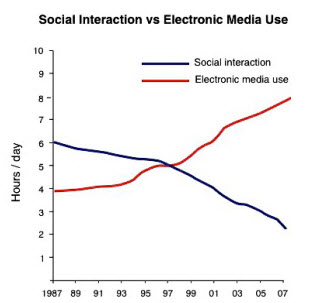Oh dear, here we go again, another mass media “attack” on Facebook. The Daily Mail today publishes another story on their theme of “the Internet is dreadful”. According to today’s bit of nonsense, Facebook will increase your risk of cancer; I jest not…!
Here’s the essence of the story. Our body’s immune system, which helps protect us against diseases including cancer, is regulated by genes. Several of those genes appear to be socially influenced. In other words, these genes need us to meet and be with other people for them to operate effectively.
That makes perfect sense; genetics for decades has told us of the importance of social contact for the selection of genes that help positive adaptation for humankind. Nothing new there really.
But it’s the notion that using Facebook will reduce social contact and therefore make these genes ineffective that’s the real problem with the article. All of the evidence is that users of social networking sites are MORE social in the “real world” than non-users.
Think about it for just a second or two. Do “loners” get engaged with “social” networks? Social networks attract sociable people – de facto. They don’t attract the popular stereotype of the sad teenage loner alone in their bedroom late at night. OK, some members may be like that, but the vast majority of social network members are social people. Indeed, there is evidence that social network use is actually INCREASING offline social activity – we meet people online and then decide it would be good to meet them “for real”.
So, assuming the social gene theory is correct, the Daily Mail’s conclusion is therefore completely wrong. Rather than Facebook increasing your risk of cancer, it will in fact do the reverse, reducing your chances of disease. Instead of writing a seeming never-ending stream of anti-Internet stories, the Daily Mail should be encouraging people to use Facebook as it will increase our real world social contact, so improving our immune systems, thereby REDUCING the risk of cancer.
 I admit that they have used an expert to produce the article – indeed it is based on a press release from The Biologist journal publicising a research paper. That paper shows a lovely graph of how our face to face contact has gone down as our electronic contact has gone up. But there are other research papers that show different graphs. As ever, research is selective. Overall, electronic communication – for which the research includes TV, radio etc. – may have led to less hours of social activity. But the data ends in 2007, thus actually excluding most of the use of social networking. Facebook, for instance, only came into being at the end of 2006 and membership only really grew in 2008.
I admit that they have used an expert to produce the article – indeed it is based on a press release from The Biologist journal publicising a research paper. That paper shows a lovely graph of how our face to face contact has gone down as our electronic contact has gone up. But there are other research papers that show different graphs. As ever, research is selective. Overall, electronic communication – for which the research includes TV, radio etc. – may have led to less hours of social activity. But the data ends in 2007, thus actually excluding most of the use of social networking. Facebook, for instance, only came into being at the end of 2006 and membership only really grew in 2008.
In other words, the data that the study is based on largely excludes social networking. Research specifically on social networking shows the reverse of this graph. Social networking use increases in the same line as social interaction. No doubt the researchers will debate this for many years to come. But you should know that the author of this study also thinks that TV and cinema is dangerous. He may be right – but I doubt it. There is considerable evidence also pointing to the reverse of his conclusions, for instance, on the impact of TV violence.
So, overall, should you worry? No. Even if Facebook were to increase your risk of cancer, the effect would be marginal in comparison to smoking, drinking alcohol and lack of exercise. And there is one other thing – social networkers appear to be happier people with lower anxiety levels. In other words, the perfect candidates for being able to defeat cancer should it arise. Go on, use Facebook, your health depends on it…!

